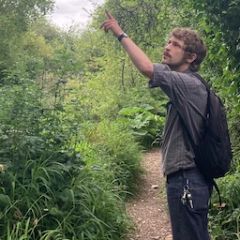
1705. It’s autumn in northern Germany. A young composer sets out from the city of Arnstadt to make the gruelling journey on foot to Lübeck, almost 400 km to the north. His reason? To hear some music by an organist – a 68-year-old organist, in fact, who is nearing the end of his career. But this isn’t just any organist, and the steadfast walker isn’t just any young composer.
At the turn of the 18th century, Johann Sebastian Bach was a young composer and musician with a voracious appetite to learn from masters and hone his craft. At the age of 15, he completed a mammoth journey – most likely on foot – from Ohrdruf to Lüneburg to study at St Michael’s school. Lüneburg, with its vibrant musical scene, left the young Bach spoilt for choice, and he was regularly able to hear the music of virtuosos like his organ teacher Georg Böhm. However, when he took his first professional post as church organist in Arnstadt in 1703, Bach reached an impasse: he was the most accomplished musician in town. Who now could he learn from?
In October 1705, he applied to his superiors for permission to leave his post for a month to hear the music of Dietrich Buxtehude (“to comprehend one thing and another about his art”, as Bach put it). The older composer was due to give a series of concerts under the title of “Abendmusik” (evening music) on Sundays throughout Advent. They must have been a mouth-watering prospect. Large ensembles were required to play Buxtehude’s music, with one performance using multiple organs, several choirs, drums, trumpets and other brass instruments and a 25-strong violin section. It was an opportunity not to be missed. Later that month, Bach left his post in the hands of his assistant and set off on the 400 km journey to Lübeck.
Historians believe Bach likely took the Old Salt Route, a well-worn trade route through northern Germany that had been in use since medieval times. It was far more common for people to undertake long journeys by foot than it is now, but even so, the dedication of the 20-year-old composer is striking. Not much is known about exactly what happened when Bach arrived in Lübeck, but what is certain is that it was definitely worth the journey. He met Buxtehude and possibly played organ or violin in the Abendmusik concerts. Some historians speculate that Buxtehude may even have offered Bach his daughter’s hand in marriage, a deal that came along with his job as Lübeck organist (Handel had been offered this very same deal, but had refused). We also know that Bach made several manuscript copies of Buxtehude’s music and transported them all back to Arnstadt. It was certainly a fruitful trip for Bach. So fruitful, in fact, that he forgot to return on time. It was well into February by the time he was back at his post in Arnstadt, meaning that he had stretched his leave of absence by almost four months. The subsequent disciplinary meeting with the church authorities was just one contributory factor in Bach’s leaving to take up a new position in Mülhausen the following year.
The influence of Buxtehude on Bach was felt even before he left Arnstadt. On his return from Lübeck, he began accompanying the church hymns in new, more complex ways, extending and varying the phrases to the extent that the congregation were unsure of when to begin singing. Buxtehude’s organ preludes also strongly influenced the preludes, toccatas and fugues that Bach would go on to compose. Other parallels abound: Buxtehude’s set of 32 keyboard variations on “La Capricciosa” is said to have inspired Bach’s own Goldberg Variations (also a set of 32 variations in G major), and the influence of older composer’s surviving ostinato bass works can be seen in Bach’s organ passacaglia (BWV 582).
On the arduous return journey to Arnstadt in early 1706, Bach transported a number of manuscripts that he had made of Buxtehude’s music. The older composer died just a year later, and it is partly thanks to Bach that his music was preserved and disseminated. Now, Buxtehude is thought of as occupying a unique place in music history: alive during the time of Heinrich Schütz – the progenitor of Protestant Baroque music – but also in the time of Bach, its most popular exponent. History, then, has vindicated Bach in sacking off his job and making the pilgrimage to Buxtehude.


